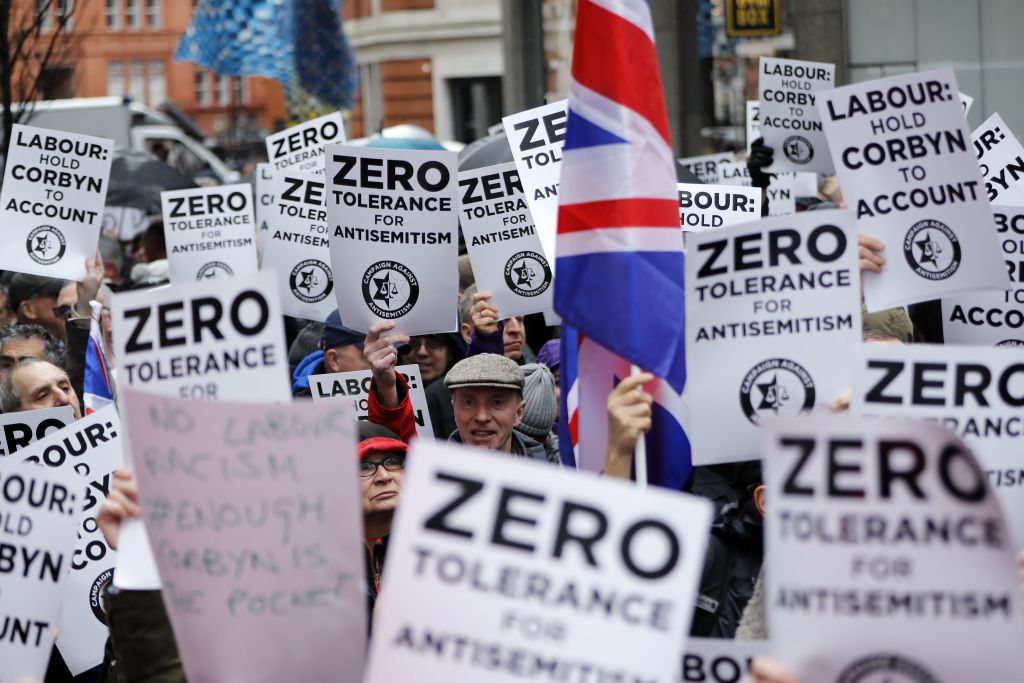It was once said that every Jewish holiday could be summed up with the same nine words: ‘They tried to kill us. They failed. Let’s eat’. Now it only takes eight: ‘A Labour spokesperson apologised for any offence caused’. On Friday, the Labour party tweeted warm wishes to Jews celebrating Passover. At this stage, most Jews are glad to receive any communication from Corbyn supporters that doesn’t ask where the Rothschilds were on 9/11, but the well-meaning post contained a blunder: the accompanying graphic showed the Star of David, a cup of wine and… a loaf of bread.
Under halakha — Jewish religious law — bread is the ultimate forbidden food during Pesach. It is chametz (leavened) and Jews must abstain in memory of the slaves who fled Egyptian bondage so quickly their bread didn’t have time to rise. No doubt Labour moderates think the Israelites should have ‘stayed to fight’ until the yeast kicked in and Tom Watson triggered a leadership contest against Pharaoh. Whoever is in charge of tweeting Labour’s Yom Kippur message would be advised to delete any pictures of bacon rolls from their phone.
Why is this facepalm different from other facepalms? It’s a relatively minor one compared to most of Labour’s behaviour towards Jews. Unfortunately for Labour, it comes after a ComRes poll showing 51 per cent of Britons believe Labour has a ‘serious’ anti-Semitism problem and 55 per cent say it makes Jeremy Corbyn ‘unfit’ to be prime minister. Unfortunately for Jews, the same pollster puts Labour 10 points clear of the Tories. The British people are on the brink of knowingly electing an anti-Semitic government and our radio phone-ins are chocked on the ethics of policemen skateboarding with anarchists.
Do the Jews have a future in the UK? The confluence of Corbynism, an alt-right that has moved from the tweets onto the streets, the forgotten threat of Islamist terrorism and a simmering hostility to kosher slaughter methods will make the coming years the most trying British Jews have faced since the war. For some gathered around seder tables over the weekend, the words ‘next year in Jerusalem’ will have prompted thoughts practical as well as spiritual. Moving to Israel involves many sacrifices but at least once there existential angst comes with an air force.
Are Jews right to be afraid? Authoritarian populism has never been good for the Jews and it isn’t about to start now. Right-wing populism — even the new variant that positions itself as pro-Israel for ‘civilisational’ reasons — is a self-evident menace but Jews are still struggling to convince progressives that their populism is no less a threat. We are indebted to Labour MP Richard Burgon for giving us another glimpse of this tendency. A video from 2014 has surfaced showing the Corbyn loyalist telling a crowd: ‘The enemy of the Palestinian people are Zionists and Zionism is the enemy of peace and the enemy of the Palestinian people.’ The shadow justice secretary previously denied making the remark and, upon seeing the video, now says he ‘do[es] not agree’ with the remark he made. He was involved but not present.
If taxes are the price we pay for a civilised society, Richard Burgon is the transaction fee on democracy’s invoice. Seeing him posed a mildly challenging question is like watching a cow try to do trigonometry. In his own way, however, he was attempting an artful distinction between Jews and Zionists. The previous line of his speech was: ‘The enemy of the Palestinian people is not the Jewish people.’ This is a favourite prophylactic of the intellectually adulterous for, as such people are ever-eager to inform you, anti-Zionism is not the same thing as anti-Semitism. Anti-Semitism is racism; anti-Zionism is politics. Of course, it’s all politics. Jew-hatred has taken many forms over the millennia — religious, racial, scientific, nationalistic — but it has been from the beginning a political project.
Why does Zionism trouble its critics so? Let’s set aside those Haredi Jews — thrust aloft as human shields by malicious Gentiles — who demur from Zionism for historical or theological reasons. (Nathan Birnbaum, who coined the term, eventually turned religious and against Zionism.) In its simplest rendering Zionism is a belief in national self-determination for the Jewish people in their ancestral homeland. You could, in theory, be anti-Zionist without being anti-Semitic but if the Jews are the only nation whose rights you deny, it rather trips an alarm. Others will affirm their belief in Jewish self-determination but regard Zionism as a supremacist ideology. Again, though, if you object to the assertion that ‘the right to national self-determination in the State of Israel is unique to the Jewish People’, to quote the Nation-State Law, you object to the existence of Israel as a Jewish state (and to all states that would not allow another nation to form a state within their borders).
Zionism scares anti-Semites for the same reason it scares Jews: Zionism is Jewish power. If that burden weighs heavy on Jews, and troubles a people to whom the powerful have seldom been friendly, it terrifies anti-Semites. Jews as victims, they can just about tolerate. But sovereign Jews are Jews no longer pleading for toleration; they are free from the whims and prejudices and peripatetic sympathies of Gentiles. They are Jews with power.
Passover is the story of Jewish freedom and, by necessity, a story of Jewish power. Pharaoh did not let the Israelites go because they asked nicely; they had the God of Israel in their corner, raining down plagues on Egypt. Today Jews have power because they have Israel. It is not the power over others that anti-Semites imagine but power over themselves. Zionism is the liberation of the Jewish people and the enemy of no one except those who would see them enslaved once more.







Comments